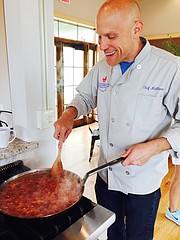In the kitchen in the quaint building that houses The Farmer's Table Cooking School (1030 Market St., Flora, 601-506-6821), Chef Matthew Sheeter is teaching "Preserving the Seasons," where students learn how to make jams and pickles and how to properly can them.
Sheeter lays out a chef's knife and cutting board for each member of the class and a recipe booklet, and they start.
They measure precise amounts of salt and sugar, and eyeball other ingredients, simmer their jams and smell the mouthwatering aromas, excited for the finished product.
Then Sheeter tells them they have to wait a few days before tasting.
Sheeter, originally from Ohio, grew up helping plant gardens and raise livestock on his grandmother Cecilia Sheeter's farm in a community outside Toledo.
He attended Johnson Wales Culinary School in Charleston, S.C., and has worked in several kitchens around the Southeast and the Midwest. He made his way to Mississippi when he began teaching at the Viking Cooking School, which was located off Highland Colony Parkway in Ridgeland.
The building that houses The Farmer's Table was built in the early phases of the Livingston town-square construction, and Dr. Alfred "Gene" Hutchinson acquired it soon after. He then enlisted local caterer Bridget Engle and her friend and colleague Sheeter to make the idea of a cooking school come to life.
As a team, the two designed the space with rustic wooden floors and ceilings, and high-end KitchenAid mixers and processors, and topped it off with two cobalt-blue Viking ranges with gas-top stoves—a foodie's ultimate dream-kitchen-come-true.
Engle, a Texas native, moved to Mississippi when her husband's job transferred them here 18 years ago. She has worked in the hospitality industry most of her career, most recently as the director of sales and marketing at Embassy Suites.
Engle and Sheeter met while they were both working at the Viking Cooking School, and after the school closed, they kept in touch. When this opportunity arose, they both dropped what they were doing and jumped in.
The Farmer's Table incorporates local ingredients into its many other classes, which include date-night courses where couples prepare their own fancy meals like "Lobster on the Beach" and indulge in wine and the company of their classmates while they cook.
For future classes, Sheeter says he wants to bring more farm-to-table elements to the lesson.
"I want to be able to walk out into (a) garden and pick the vegetables we are going to cook," he says.
"We are eventually going to design some classes (where) we'll explain we are walking out onto the farm, we're grabbing this, and we're coming back and making a meal of it."
For more information and class schedules, visit farmerstableinlivingston.com. Read more local food coverage at jfp.ms/food.
Matthew Sheeter's Canning Tip Sheet
• "Cans," or mason jars, along with their lids must be sanitized, meaning that you have to boil them for several minutes and place them on a clean surface until you are ready to fill them.
• Sanitize cans in a lighter-colored pot, as you tend to lose sight of them in darker pots.
• Use rubber tongs to place the cans into the pot and to retrieve them.
• To fully seal cans, place them back into boiling water once you have your ingredients inside and the lid is closed tightly. The pressure of the heat will cause the jar to fully seal. A popping sound assures that the can is fully sealed, this will happen as the jar cools once it is removed from the water.
• And, most importantly: DO NOT eat anything from a jar that doesn't "pop" upon first opening it or from a jar with a rusted lid. Botulism is real, folks.
To explore a wide range of canning recipes for jams, pickles, sauces and more, visit fresh preserving.com.



Comments
Use the comment form below to begin a discussion about this content.
comments powered by Disqus